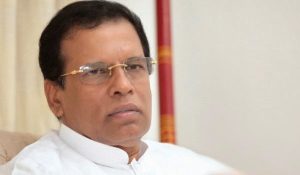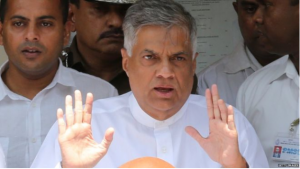Colombo, February 11 (newsin.asia): Former Sri Lankan President Mahinda Rajapaksa’s Sri Lanka Podujana Party (SLPP) is heading for a sweeping victory in the crucial all-island local government elections held on Saturday.
It is a victory of far reaching consequence to Sri Lankan nation’s politics in the near term as it is seen as a “referendum” on the performance of the Sirisena-Wickremesinghe regime which came into being in 2015.
341 local government councils and 8356 seats were up for grabs in the elections held after a gap of seven years.
Both the ruling and the opposition parties had made it an election of national importance with national issues kept in the forefront and local issues brushed under the carpet.
Therefore, the government headed by President Maithripala Sirisena, conscious of its lackluster performance at all levels, kept postponing the polls until it became an embarrassment for it. The opposition led by Rajapaksa kept taunting it on a daily basis through the media.
Given the overall disillusionment with the regime, it is not surprising that the SLPP led by opposition stalwart Rajapaksa has done far better than the Sri Lanka Freedom Party/United Peoples’ Freedom Alliance led by President Sirisena, and the United National Party (UNP) led by Prime Minister Ranil Wickremesinghe.
As per results available at 10.15 am on Sunday, the SLPP had won 755, out of the 8356 seats; the UNP 495; the United Peoples’ Freedom Alliance (UPFA) 159; Janata Vimukthi Peramuna; 79 and Sri Lanka Freedom Party (SLFP) 97.
Since the UPFA and SLFP belong to the same group, their combined score was 256. But this too was no match for the SLPP which miles ahead.
The full results are expected towards the later afternoon on Sunday.
Tamil Areas
In the Tamil areas, the Ilankai Tamil Arasu Katchi (ITAK) is streets ahead of other parties. According to one of the leading lights of the ITAK, the party could capture 40 of the 56 councils in the Tamil majority Northern Province.
However, ITAK suffered a shock defeat in the Jaffna-Point Pedro Urban Council where it came second, losing the first position to the Akila Ilankai Tamil Congress led by Gajendra Kumar Ponnambalam, a radical Tamil nationalist. The AITC secured 6 seats while ITAK was a close second at 5.

Consequences For Sirisena
The all-Island results could seriously affect the political prospects of President Sirisena whose SLFP/UPFA has performed very poorly compared to the SLPP and UNP.
The rank and file of the SLFP/UPFA would now put pressure on Sirisena to join forces with the SLPP as the SLPP is only a breakaway group of the SLFP/UPFA.
Votaries of a Sirisena-Rajapaksa rapprochement will get a shot in the arm. But it might still be very difficult for Sirisena to make up with Rajapaksa as he had defected to the opposition to contest the January 8, 2015 Presidential election against Rajapaksa.
Sirisena had also refused to appoint Rajapaksa Prime Minister even if his group had won the August 2015 parliamentary elections. Sirisena is currently pursuing many corruption cases against Rajapaksa, his clan and coterie.
Sirisena-UNP Rift To Widen
With the UNP doing much better than the SLFP/UPFA, it’s power in the coalition government would increase several fold. Sirisena, who had been overturning the UNP’s neo-liberal decisions to suit his traditionalist and populist agenda, will not be able to do so from now on.
Tension between the UNP leader cum Prime Minister Ranil Wickremesinghe, and the SLFP/UPFA leader cum President Sirisena will increase.
The coalition government for Good Governance could even fall before the 2020 Presidential and parliamentary elections.

Impact on Tamil Politics
As for Tamil politics in North Sri Lanka, the results show that opposition to the dominant ITAK is growing, although the ITAK is still number one.
It will no longer be possible for the ITAK to take things for granted. It has to deliver on its promise to get a better devolution package through a new constitution as declared in its 2015 election manifesto.
Premananth, a keen observer of Tamil politics in Jaffna, said that distribution of power in the local councils will be problematical in a majority of the cases, because of the presence of so many parties. This in turn will affect developmental programs, he added.
New Constitution
And with Rajapaksa becoming politically very significant, efforts to draft a new constitution devolving power to the minority dominated Northern and Eastern provinces will be problematic, if not impossible, said Kilinochch-based political analyst Sivarasa Karunakaran.
Rajapaksa has said many times that the Tamils cannot get through talks what they could not seize by waging war.
However, Rajapaksa’s ascendency and the possibility of his party coming to power in 2020 will brighten the chances of implementing development projects which are currently shelved for want of a politically and ideologically united and functioning government.
(The featured image at the top shows a thrilled Mahinda Rajapaksa, head of Sri Lanka Podujana Peramuna and former President of Sri Lanka)





























































